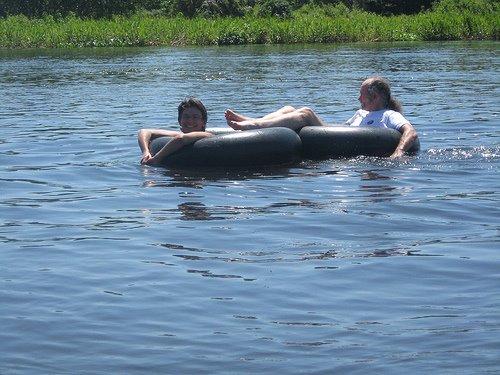For a long time, I´ve been meaning to write an entry about water, one of Bolivia´s biggest problems. All of the water in Bolivia is contaminated. You can´t drink tap water anywhere in the country. Not only must you avoid drinking the water, you must avoid eating anything that has been contaminated by water. Vegetables must either be decontaminated by cooking or peeling, or soaked in water treated with iodine.
During my first week in Cochabamba, I had a severe case of turista which caused me to vomit for 12 hours straight, and was probably caused by drinking tap water in the form of a fruit drink at a restaurant.
I have a bank account, and therefore access to medical care if I need it, but hundreds of Bolivians die every year from diarrhea caused by contaminated food or water.
Also thanks to my bank account, I have a huge bottle of purified water delivered to my door several times a week, while many Bolivians must gather rain water and decontaminate it by boiling.
We are lucky to have contaminated tap water piped to our sinks, toilets and shower and ready for our use. Thanks to the World Bank and a U.S. corporation, the people of Cochabamba almost lost this basic right a few years ago, but fought back during the famous Cochabamba water war. Quoting from Lonely Planet´s Bolivia guide:
"With the rapid growth of Cochabamba in the late 20th century, water shortages became acute, and the city sought financing for a tunnel that would bring water through the mountains from another zone. But the World Bank, then more or less controlling Bolivia~s economy, refused to countenance the government spending money on the project and forced them to sell the province´s water utility to the US giant Bechtel, who rapidly put the rates up.
But the company hadn´t reckoned with the citizens, who rapidly established an organizatin to oppose the sale. With the pe9ople furious at the rate hike, strikes were called in February 2000. The citizenry took to the streets and, after violent clashes with police, forced the government to negotiate. Arrogantly, the government refused to deal with the people´s organization, and suggested a gradual price rise. This was angrily rejected, and a general strike called for early April. Nearly a hundred thousand people from all walks of life occupied the streets; when the police foolishly arrested the movement´s leader, the situation rapidly deteriorated, and one man was shot by an army sniper. Things then quieted, but a massive march two days later finally forced Bechtel out, submitting a huge compensation claim in the process. Anti-globalization campaigners around the world saw it as a highly symbolic popular victory over a multinational that had bullied the Bolivian government with World Bank complicity.
These days, the water rates are back at pre-privatization levels, but, although the community water company is gradually increasing service, the money for the much-needed pipeline is as far away as ever. Still, cochabambinos remain justly proud of their victory."
The water war is one of the first things I learned about Cochabamba, as it was featured in one of Michael Moore´s movies several years ago. I can´t remember which one.
Beyond water itself, hot water is another problem in Bolivia. Our accommodations are luxurious in that we have running water, and an electric water heater in our shower. But like even rich Bolivians, we have no hot water in the kitchen or bathrom sinks. Sometimes we heat dishwashing water on the stove, but other times we observe the Bolivian custom of washing the dishes in cold water, using lots of detergent.
Tuesday, April 1, 2008
Subscribe to:
Post Comments (Atom)

No comments:
Post a Comment